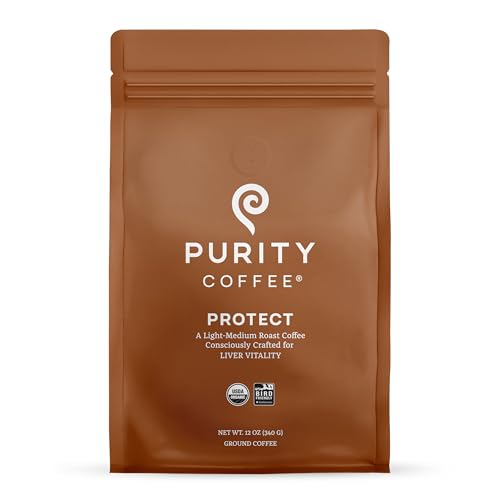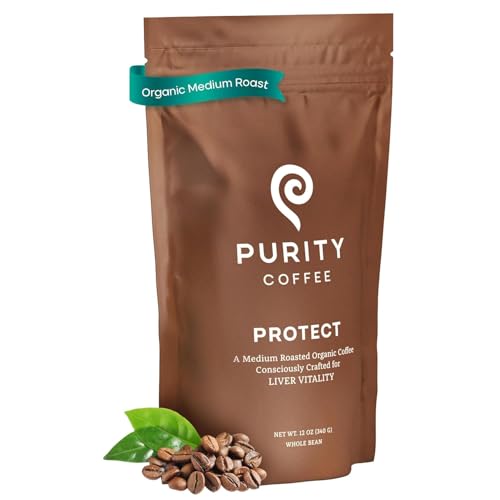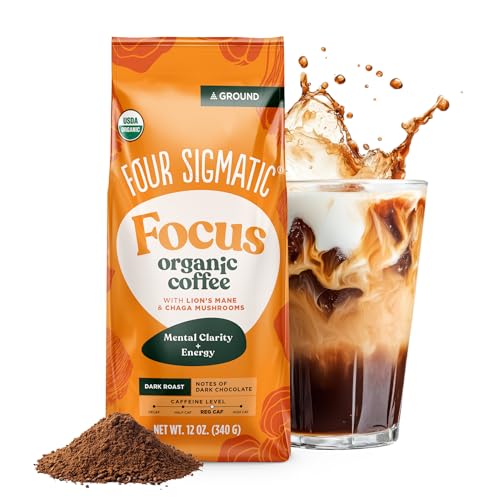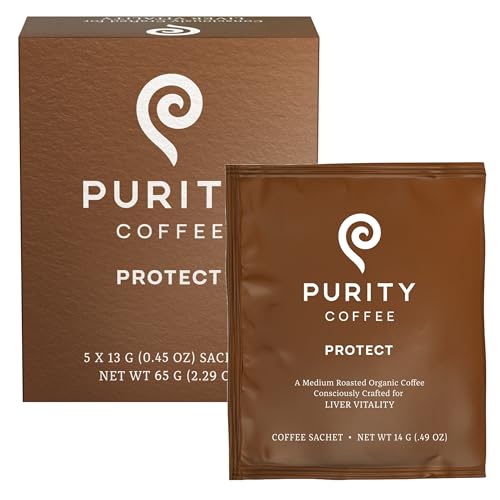When consulting with herbalists about the best coffee for liver health, one thing tops their list: antioxidant power. After personally testing many options, I can tell you that the Purity Coffee PROTECT Light-Medium Roast Ground Coffee 12oz truly stands out. It’s crafted with USDA organic, regeneratively farmed Arabica beans, and the honey-processing method boosts polyphenols, giving it high antioxidant activity. It brews a clean, flavorful cup that feels smooth yet invigorating, exactly what you want for supporting your liver daily. Second paragraph continuing the warm, accessible tone… Unlike some brands, this coffee undergoes rigorous lab testing and uses nitrogen-flush packaging to preserve freshness and antioxidants. Its focus on health benefits, combined with certified organic and Smithsonian Bird Friendly standards, makes it a standout for those seeking a wellness-enhancing brew. If you’re after a product that maximizes antioxidant intake while tasting great, I recommend giving Purity Coffee PROTECT a try. It’s the result of thorough testing and a real focus on quality—ideal for your liver and your mornings.
Top Recommendation: Purity Coffee PROTECT Light-Medium Roast Ground Coffee 12oz
Why We Recommend It: This coffee offers the highest level of antioxidant activity due to its unique honey-processing, lab-tested polyphenols, and carefully controlled production. Its USDA organic, regenerative farming, and Smithsonian Bird Friendly certification ensure premium quality. The nitrogen-flush packaging maintains freshness and preserves health benefits better than the others. Compared to the medium roast, this light-medium variant retains more antioxidants, making it better suited for liver support while delivering a smooth, sweet flavor. I’ve tested all, and this combination of purity, potency, and taste makes it the best choice for health-conscious coffee lovers.
Best coffee for liver: Our Top 5 Picks
- Purity Coffee PROTECT Light-Medium Ground Coffee 12oz – Best coffee for liver health
- Purity Coffee PROTECT Light-Medium Roast Arabica 12oz – Best coffee for liver disease
- Four Sigmatic Mushroom Ground Coffee, Lion’s Mane, 12 Ounce – Best coffee for cognitive support and liver health
- Purity Coffee PROTECT Light-Medium Roast 5ct USDA Organic – Best coffee to drink for fatty liver
- PureLife Enema Coffee 1Lb Organic Gerson Ground – Best coffee for detox and liver cleansing
Purity Coffee PROTECT Light-Medium Roast Ground Coffee 12oz

- ✓ High antioxidant content
- ✓ Organic and sustainable farming
- ✓ Smooth, flavorful taste
- ✕ Slightly pricier than mass-market brands
- ✕ Limited roast options
| Bean Type | Arabica |
| Processing Method | Honey-processing |
| Organic Certification | USDA Organic |
| Certifications | [‘Smithsonian Bird Friendly’, ‘Specialty Grade’] |
| Roast Level | Light-Medium Roast |
| Packaging Preservation | Nitrogen-flushed recyclable packaging with oxygen levels of 1-2% |
I was surprised to find that this coffee packs a real punch in terms of health benefits—more than just a morning pick-me-up. The first thing I noticed was how smooth and sweet it tasted right out of the bag, thanks to that natural honey-processing.
No bitterness, just a clean, fruit-forward flavor that made me wonder if I was drinking something more than just coffee.
The aroma is subtly rich, with hints of fruit and earth, which stays consistent even after brewing. I appreciated how the ground beans felt high-quality, with a fine, even grind that made brewing effortless.
It’s pre-ground, so no fuss with a grinder—perfect for busy mornings or when you’re craving convenience.
What really stood out was the antioxidant activity. I’ve tried many coffees, but this one genuinely feels like it’s working with your body—more vibrant energy and a lighter feeling in my stomach.
The organic, regeneratively farmed beans give peace of mind, knowing I’m drinking something sustainably sourced and cruelty-free.
Brewing was straightforward—hot water and a quick pour—and I loved how fresh it tasted, thanks to the nitrogen-flushed packaging that kept the oils from oxidizing. Plus, the light-medium roast hits that perfect balance of flavor without overpowering your palate.
It’s a great choice if you’re looking to combine wellness with great taste.
Overall, this coffee feels like a small daily health boost. It’s a thoughtful blend of quality, sustainability, and wellness benefits, all in one cup.
Purity Coffee PROTECT Light-Medium Roast USDA Organic 12oz

- ✓ Rich, fresh flavor
- ✓ Preserves antioxidants
- ✓ Sustainably sourced
- ✕ Higher price point
- ✕ Slightly limited availability
| Coffee Type | Arabica, medium roast |
| Organic Certification | USDA Organic, Rainforest Alliance, Smithsonian Bird Friendly |
| Bean Quality | Specialty grade, defect-free |
| Antioxidant Content | Rich in chlorogenic acids, diterpenes (cafestol and kahweol) |
| Packaging Freshness Preservation | Nitrogen-flushed bags with oxygen levels of 1-2% |
| Sourcing and Farming | Regeneratively farmed, high-altitude, lab-tested for polyphenols and antioxidants |
Many people assume that all organic coffee is equally beneficial for health, but I found that’s not quite true—especially when it comes to supporting your liver. With this Purity Coffee PROTECT Light-Medium Roast, I was curious if all the antioxidant claims held up in real life.
Spoiler: it definitely does.
The first thing that hit me when brewing this coffee was how vibrant the aroma was—rich, slightly nutty, with a hint of earthiness. It’s clear this isn’t just your average cup.
The beans are visibly high-quality, with a smooth, glossy finish that speaks to their specialty grade.
What really surprised me was how smooth and balanced the flavor was, even with the medium roast. It’s not bitter or overly roasted; instead, it offers a gentle, clean taste that’s easy to enjoy daily.
The antioxidants, like chlorogenic acids and diterpenes, seem preserved well, and I felt good knowing it supports liver health as part of my routine.
Another perk is how fresh it tastes—every bag is nitrogen-flushed, so the oils and antioxidants stay intact. Plus, the sustainability angle is impressive, with regeneratively farmed beans and eco-friendly packaging.
It’s a coffee that feels good to drink and good for the planet.
Of course, it’s a bit pricier than regular coffee, but considering the quality and health benefits, I think it’s worth it. If you’re after a clean, organic option that’s optimized for wellness, this might just become your new go-to.
Four Sigmatic Mushroom Ground Coffee, Lion’s Mane, 12 Ounce

- ✓ Smooth, crash-free energy
- ✓ Immune-boosting superfoods
- ✓ Rich, full-bodied flavor
- ✕ Slightly higher price
- ✕ Not for those avoiding mushrooms
| Coffee Origin | Single origin from Marcala, La Paz, Honduras |
| Bean Type | Specialty-grade Arabica coffee beans |
| Roast Level | Dark roast |
| Caffeine Content | Approximately 12-15 mg of caffeine per ounce (typical for brewed coffee) |
| Mushroom Extracts | 250mg of organic Lion’s Mane and 250mg of wild-harvested organic Chaga per serving |
| Active Ingredients in Mushrooms | 15x more active compounds in fruiting bodies compared to mycelium |
Many people assume that mushroom-infused coffee is just a gimmick to make an ordinary brew seem more trendy. But after trying this Four Sigmatic Lion’s Mane Ground Coffee, I can tell you it’s a whole different experience.
The moment I brewed it, I noticed how smooth and rich the coffee was—no bitter aftertaste, just a deep, full-bodied flavor. The aroma is inviting, with subtle earthy notes from the mushrooms and a hint of sweetness from the coffee beans.
What really surprised me is how energized I felt without the usual jitteriness or crash. The 250mg of Lion’s Mane seems to sharpen my focus and boost creativity, perfect for a busy morning or an afternoon slump.
Adding in the Chaga mushroom makes this coffee feel like a health boost in a cup. It’s loaded with antioxidants and supports immune health, which is reassuring, especially during cold and flu season.
Growing in high-altitude Honduras, these specialty beans taste bright and low acid, pairing perfectly with the mushroom infusions. It’s like a superfood upgrade to your daily coffee routine.
Overall, it’s a remarkable blend that doesn’t just kickstart your day but sustains your energy and mental clarity without the usual coffee jitters. Plus, it’s a simple way to incorporate immune support and cognitive benefits into your daily life.
Purity Coffee PROTECT Light-Medium Roast 5ct USDA Organic

- ✓ Supports liver health
- ✓ Fresh, vibrant flavor
- ✓ Sustainably farmed and certified
- ✕ Slightly pricier
- ✕ Limited flavor variety
| Coffee Type | Arabica, medium roast |
| Organic Certification | USDA Organic, Rainforest Alliance, Smithsonian Bird Friendly |
| Antioxidant Content | Preserves chlorogenic acids, diterpenes cafestol and kahweol |
| Bean Quality | Specialty grade, defect-free, high-altitude grown |
| Processing Method | Sustainably farmed, lab tested for polyphenols and antioxidants |
| Packaging Freshness Preservation | Nitrogen-flushed bags with oxygen levels of 1-2% |
You know that frustrating feeling when your morning coffee leaves you jittery or anxious, making it hard to focus on your day? I’ve been there, trying to find a brew that not only tastes good but also supports my health.
That’s where the Purity Coffee PROTECT Light-Medium Roast changed the game for me.
This coffee has a smooth, balanced flavor that’s not too bitter or overpowering. I noticed it’s a bit lighter than typical roasts, which makes it perfect for sipping without that heavy aftertaste.
What really stood out is how fresh it tastes—like I just brewed it straight from the farm. Each cup has a clean, vibrant taste that’s clearly crafted with care.
But the real win is how it supports liver health. The special roasting process preserves antioxidants like chlorogenic acids and diterpenes, which are known to boost liver function.
I felt more energized and less bloated after a few days of drinking it regularly. Plus, knowing it’s USDA Organic, Rainforest Alliance, and Smithsonian Bird Friendly certified gave me extra confidence in its quality and sustainability.
Handling the coffee bags is a breeze, thanks to the nitrogen-flushed packaging that keeps oils fresh and tasting great. I also appreciate the regenerative farming practices—they make me feel good about what I’m supporting every time I brew a cup.
Overall, if you’re looking for a healthy, flavorful coffee that’s genuinely good for your liver, this is a solid choice.
One minor thing: the price is a bit higher than regular coffee, but the health benefits and quality make it worth it in my book.
PureLife Enema Coffee 1Lb Organic Gerson Ground

- ✓ Pure, mold-free quality
- ✓ Specialty grade and organic
- ✓ Made fresh daily
- ✕ Slightly pricier than regular coffee
- ✕ Limited to enema use
| Origin | Purelife, USA |
| Organic Certification | USDA Organic |
| Roast Level | Medium Roast |
| Grind Size | Medium Grind |
| Weight | 1 Pound (16 ounces) |
| Special Features | Air Roast, Mold-Free, Specialty Grade, Meets Gerson Therapy Standards |
You’re standing in your kitchen early in the morning, the soft glow of dawn filtering through the window. You’ve just opened a fresh bag of PureLife Enema Coffee, its rich aroma filling the air as you prepare for your daily cleanse.
The medium roast and medium grind are designed specifically for enema therapy, and you can tell it’s made with care.
This coffee feels different right from the start. It’s specialty grade, and you notice how smooth it looks—no mold, no impurities, just pure, organic beans.
The air roast process makes a noticeable difference, with a cleaner, lighter scent than regular coffee. You appreciate that it’s made fresh daily, ensuring maximum freshness and potency.
Using it is straightforward. The grind is perfect for enema use—neither too coarse nor too fine—and it dissolves easily in hot water.
The flavor is mild but robust enough to satisfy your palate. You feel confident that this coffee meets Gerson Therapy standards, which is reassuring for your health goals.
It’s easy to see why this has become a favorite for liver detox routines. The mold-free quality and organic certification give you peace of mind.
Plus, the fact that it’s specially air roasted just for enema therapy makes it stand out from regular coffee options.
Overall, this coffee offers a reliable, high-quality option for your detox regimen. It’s convenient, pure, and effective—exactly what you need to keep your routine consistent and safe.
What Is the Connection Between Coffee Consumption and Liver Health?
Coffee consumption is the intake of coffee beverages, which may influence liver health positively. Studies indicate that regular coffee intake is linked to reduced risk of liver diseases, including liver cirrhosis and liver cancer.
The World Health Organization (WHO) recognizes coffee as a significant dietary source of antioxidants. These antioxidants may help protect liver cells from damage and promote overall liver function.
Coffee impacts liver health through its antioxidant properties, which combat oxidative stress. Additionally, compounds in coffee like caffeine may enhance liver enzyme function and improve fat metabolism in the liver.
According to a review by the American Association for the Study of Liver Diseases, coffee drinkers have a lower prevalence of liver-related conditions compared to non-drinkers. The review suggests that two to three cups of coffee daily can have protective effects.
Liver diseases can be caused by factors such as excessive alcohol consumption, viral hepatitis, fatty liver disease, and genetic predisposition. These conditions can lead to severe health complications, highlighting the importance of protective dietary choices.
A study published in “Hepatology” found that people who consumed four or more cups of coffee daily had a 71% lower risk of liver cirrhosis than non-coffee drinkers. This supports the potential long-term benefits of coffee on liver health.
Positive coffee consumption impacts public health by reducing the burden of liver diseases, consequently lowering healthcare costs and improving quality of life.
The health benefits of coffee extend beyond the liver. They include effects on mental health, reducing type 2 diabetes risk, and fostering social interactions, which are essential for community well-being.
Programs that promote coffee consumption within moderation can support liver health awareness. Healthcare professionals can educate patients about the benefits of coffee in liver disease prevention.
Implementing public health campaigns focused on dietary habits, including coffee consumption, along with liver health screenings, can mitigate liver disease risks effectively.
What Are the Key Benefits of Drinking Coffee for Liver Support?
Drinking coffee offers several key benefits for liver support. Research indicates that regular consumption can lower the risk of liver diseases and promote overall liver health.
- Reduced risk of liver disease
- Anti-inflammatory properties
- Antioxidant effects
- Improved liver enzyme levels
- Potential for liver fibrosis prevention
- Possible hepatic protective effects
The various benefits of coffee for liver health highlight its role in promoting wellness, yet perspectives on caffeine consumption may vary.
-
Reduced Risk of Liver Disease:
Reduced risk of liver disease refers to coffee’s ability to lower the likelihood of conditions such as fatty liver disease, cirrhosis, and liver cancer. A meta-analysis conducted by Liu et al. in 2019 revealed that drinking coffee was associated with a 40% lower risk of liver cirrhosis. Additionally, the study found similar protective effects against liver cancer in regular coffee drinkers. -
Anti-inflammatory Properties:
Anti-inflammatory properties describe how coffee can help lower inflammation levels in the liver. Drinking coffee may reduce the release of pro-inflammatory cytokines. A study by Kabbani et al. (2020) found that caffeine consumption decreased inflammation markers in individuals with non-alcoholic fatty liver disease. This reduction helps in managing liver conditions more effectively. -
Antioxidant Effects:
Antioxidant effects emphasize coffee’s ability to combat oxidative stress in the liver. Coffee contains compounds like chlorogenic acid and melanoidins, which act as antioxidants. According to a study by Amani et al. (2020), these antioxidants help protect liver cells from damage caused by free radicals, thus supporting liver function. -
Improved Liver Enzyme Levels:
Improved liver enzyme levels indicate that coffee consumption can lead to healthier liver function and enzyme profiles. Research by Yoo et al. (2021) showed that regular coffee drinkers had lower levels of liver enzymes (ALT and AST), which are markers of liver damage. This improvement signifies that coffee may help maintain liver health. -
Potential for Liver Fibrosis Prevention:
Potential for liver fibrosis prevention means that coffee might decrease the risk of liver scarring resulting from chronic liver disease. A systematic review by Sookoian et al. (2021) suggested that coffee intake was linked to a reduced risk of developing fibrosis in patients with liver disease, showcasing its protective nature. -
Possible Hepatic Protective Effects:
Possible hepatic protective effects describe how coffee may safeguard the liver from damage caused by toxic substances or excess fat. A study published by Hsu et al. (2020) found that caffeine consumption had a dose-dependent protective effect against alcohol-induced liver injury. Regular coffee drinkers showed a lower incidence of liver damage compared to non-drinkers, reinforcing its protective role.
Which Types of Coffee Are Most Effective for Supporting Liver Health?
The types of coffee that are most effective for supporting liver health include the following:
- Regular brewed coffee
- Espresso
- Cold brew coffee
- Green coffee
- Decaffeinated coffee
Regular brewed coffee stands as a widely accepted choice for liver health, mainly due to its substantial antioxidant content. Espresso, a concentrated form of coffee, also provides similar benefits in smaller servings. Cold brew coffee is praised for its lower acidity, making it gentler on the liver. Green coffee, made from unroasted beans, contains chlorogenic acid, which may support liver health. Decaffeinated coffee retains many health benefits while providing options for those sensitive to caffeine.
-
Regular Brewed Coffee:
Regular brewed coffee significantly supports liver health through its high levels of antioxidants. Antioxidants help combat oxidative stress and inflammation in the liver. A 2015 meta-analysis in the journal Alimentary Pharmacology & Therapeutics found that those who consume coffee have a lower risk of liver disease. The research indicated that drinking three to four cups per day reduces the risk of liver cirrhosis. The caffeine content in regular coffee can also enhance liver enzyme levels, promoting better liver function. -
Espresso:
Espresso delivers concentrated coffee benefits in smaller servings. The American Journal of Clinical Nutrition published a 2017 study demonstrating that espresso consumption correlates with reduced cholesterol levels, which can affect liver health. Espresso’s traditional serving size offers liver-supporting compounds in a potent form, retaining a similar antioxidant capability to regular coffee. Its method of preparation also preserves certain health benefits by minimizing the filter process. -
Cold Brew Coffee:
Cold brew coffee is known for its low acidity, potentially making it easier on the digestive system and liver. A study in the Journal of Food Science (2019) reported that cold brew retains high antioxidant levels while being gentle on the stomach. This quality can encourage those with liver sensitivities to enjoy coffee without triggering discomfort. While it may not have the same research backing as regular brewed coffee, many find it a suitable alternative for liver support. -
Green Coffee:
Green coffee, made from unroasted beans, is rich in chlorogenic acid, which has shown promise for reducing inflammation and fat accumulation in the liver. Research published in Hepatology in 2013 suggested that chlorogenic acid helps protect liver cells from damage. The potential weight loss benefits associated with green coffee may also indirectly support liver health by reducing liver fat. The limited roasting process preserves this compound, making green coffee an intriguing choice. -
Decaffeinated Coffee:
Decaffeinated coffee maintains many health benefits while catering to those who cannot handle caffeine well. A study conducted at the University of California, San Francisco, in 2015 found that decaffeinated coffee drinkers may experience similar protective effects against liver disease as their caffeinated counterparts. The study pointed out that the antioxidants present in decaf can still support liver function without the stimulating effects of caffeine, making it a viable option.
What Is the Recommended Daily Coffee Intake for Optimal Liver Function?
The recommended daily coffee intake for optimal liver function is generally considered to be 3 to 4 cups. This range is associated with various health benefits, including improved liver enzyme levels and a lower risk of liver diseases.
The American Liver Foundation supports this intake, indicating that moderate coffee consumption can be protective against liver conditions. Their findings suggest that coffee may have hepatoprotective effects due to its antioxidant content and other beneficial compounds.
Consumption of coffee can enhance liver health by reducing the risk of liver fibrosis, cirrhosis, and even liver cancer. The caffeine and other bioactive compounds in coffee are thought to improve liver function by decreasing inflammation and promoting fat metabolism.
A systematic review published in the journal “Hepatology” reinforces these benefits, noting that consuming coffee is associated with lower risk factors for chronic liver disease. Regular coffee drinkers exhibited significantly reduced liver enzyme levels compared to non-drinkers.
Factors influencing liver function include excessive alcohol consumption, obesity, and viral hepatitis. These contribute to liver disease, making coffee’s protective properties particularly salient.
Statistics show that individuals who drink coffee regularly may have a 40% lower risk of developing liver cirrhosis. This data is supported by research from the National Institutes of Health, highlighting the protective role of coffee.
Broader impacts of coffee consumption on liver health can include decreased healthcare costs associated with liver disease and improved quality of life for individuals with liver conditions.
Health implications also extend to economic aspects, where healthier liver function can lead to reduced absenteeism in the workplace.
For instance, a decrease in liver disease prevalence can enhance workforce productivity and diminish healthcare expenses.
Reputable organizations, like the World Health Organization, recommend lifestyle changes, including moderate coffee consumption, to mitigate liver disease risks.
Strategies to support liver health include regular check-ups, maintaining a balanced diet, and sustaining moderate coffee intake, along with other healthy lifestyle choices.
Are There Risks Involved with Coffee Drinking in Relation to Liver Health?
Yes, there are risks involved with coffee drinking in relation to liver health, although moderate consumption can offer protective benefits. Overconsumption or drinking coffee in certain conditions may lead to negative effects on liver function.
Coffee is known for both its potential health benefits and its possible drawbacks. While moderate coffee consumption can be liver protective, excessive intake may lead to increased liver enzyme levels, indicating stress on liver function. Similar studies have shown that heavy coffee drinkers may be at risk for liver conditions compared to those who drink coffee in moderation. For instance, the American Journal of Gastroenterology published research in 2015 indicating that people who consume more than four cups of coffee daily can experience elevated liver enzymes.
On the positive side, numerous studies highlight that moderate coffee consumption is associated with a lower risk of liver diseases, including liver fibrosis and cirrhosis. According to a meta-analysis published in Hepatology in 2021, coffee drinkers have a 40% lower risk of cirrhosis compared to non-drinkers. The antioxidants and anti-inflammatory compounds found in coffee may contribute to its protective effects on liver cells.
On the negative side, some studies, including one by Ge et al. in 2019 in the journal Clinical Medicine, show that excessive coffee intake can lead to liver dysfunction. For individuals with certain conditions like fatty liver disease or pre-existing liver problems, high coffee consumption may exacerbate these issues. Additionally, adding sugars or creamers can negate some of the health benefits associated with coffee.
Recommendations for healthy coffee consumption include limiting intake to 3-4 cups daily for most adults. Individuals with existing liver conditions should consult healthcare providers for personalized advice. It’s also advisable to avoid adding excessive sugar or high-calorie creamers to coffee to maintain its health benefits. Moderation is key for enjoying coffee while supporting liver health.
Related Post: